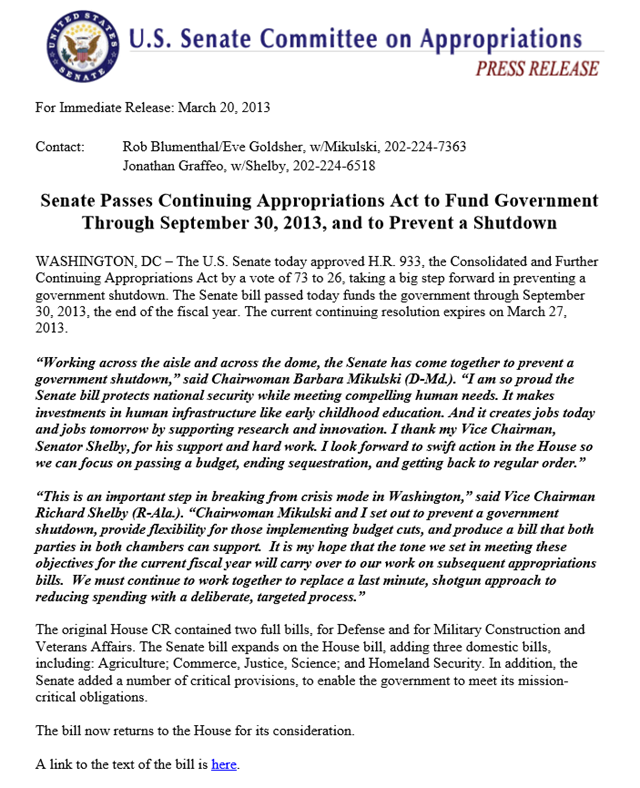The losers in the latest U.S. budget deal: the rural poor, EPA, NASA
By Suzy Khimm
22 March 2013 (Washington Post) – Both Democrats and Republican leaders celebrated the passage of a short-term budget that averted a government shutdown while blunting some of the worst effects of sequestration. “I am so proud the Senate bill protects national security while meeting compelling human needs. It makes investments in human infrastructure like early childhood education,” Sen. Barbara Mikulski (D-Md.), chair of the Senate Appropriations Committee, said in a statement. “This is an important step in breaking from crisis mode in Washington,” added her GOP counterpart, Sen. Richard Shelby (R-Ala.). The Continuing Resolution that passed Congress this week did bolster funds for a wide swath of popular programs — ranging from Head Start and local firefighters to cancer research and clean water projects in rural communities — to ease some of the sting of the across-the-board sequester cuts that are still in place. But it helped those initiatives at the expense of other programs because Congress is still required to comply with the overall caps to spending under the Budget Control Act passed in 2011 to resolve the debt-ceiling standoff. As there hasn’t been a big budget agreement to repeal the BCA, total government discretionary spending must remain at $1.043 trillion for FY 2013, turning the budget into something of a zero-sum game that entails difficult, sometimes painful trade-offs. What’s more, Commerce, Justice, and Science Appropriations took a further 1.877 percent across-the-board hit because of earlier spending on Superstorm Sandy aid and the “fiscal cliff” deal, according to the Senate Appropriations Committee. A Congressional aide sent over a partial list of the programs that got cut further in the latest short-term budget when the Senate took up the original House-passed bill — i.e., the CR’s losers. The Senate Appropriations Committee has confirmed the following reductions:
- EPA accounts (programs and management; state and tribal assistance; Superfund clean-up): $106 million cut
- NASA: $273 million cut
- Federal Bureau of Investigation: $128 million cut*
- NOAA account that funds weather satellites: $61 million cut
- Army Corps of Engineers construction projects: $20 million cut
- Wildland fire management: $570 million cut
- Rural rental assistance for low-income families: $20.3 million cut [more]
The losers of the latest budget deal: the FBI, the rural poor, the environment
